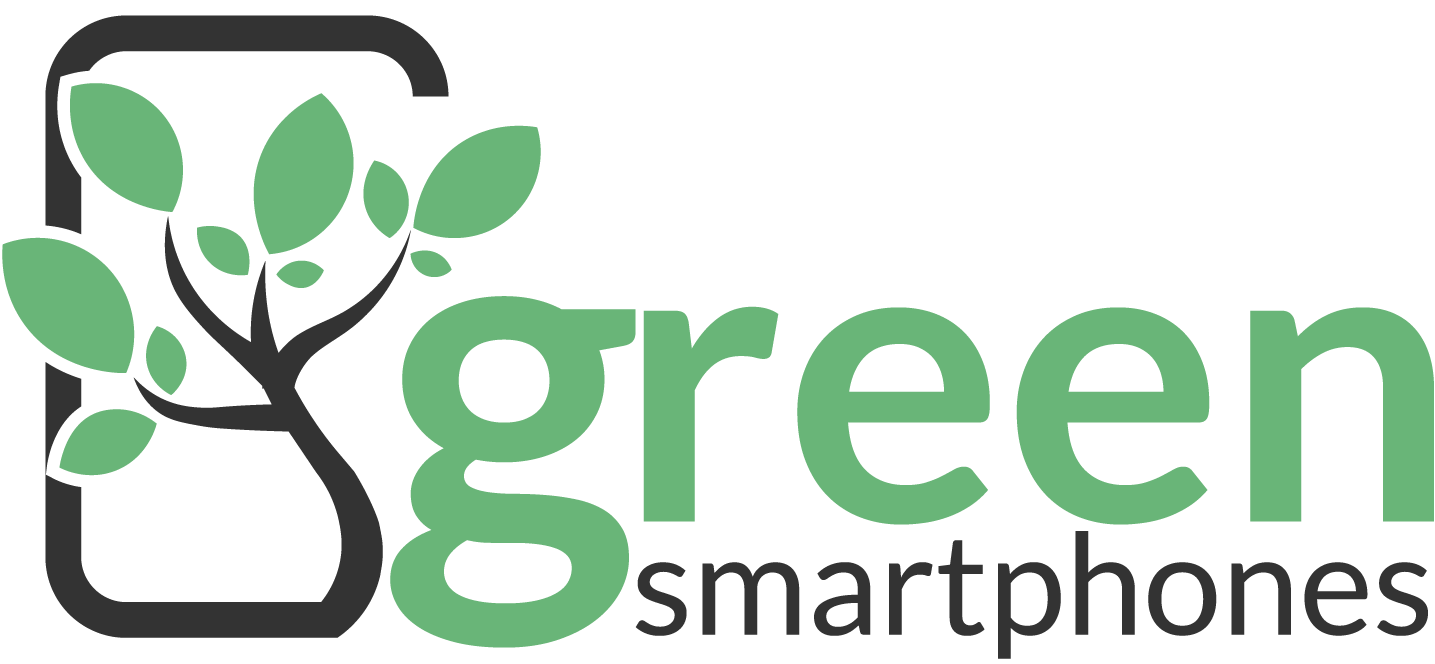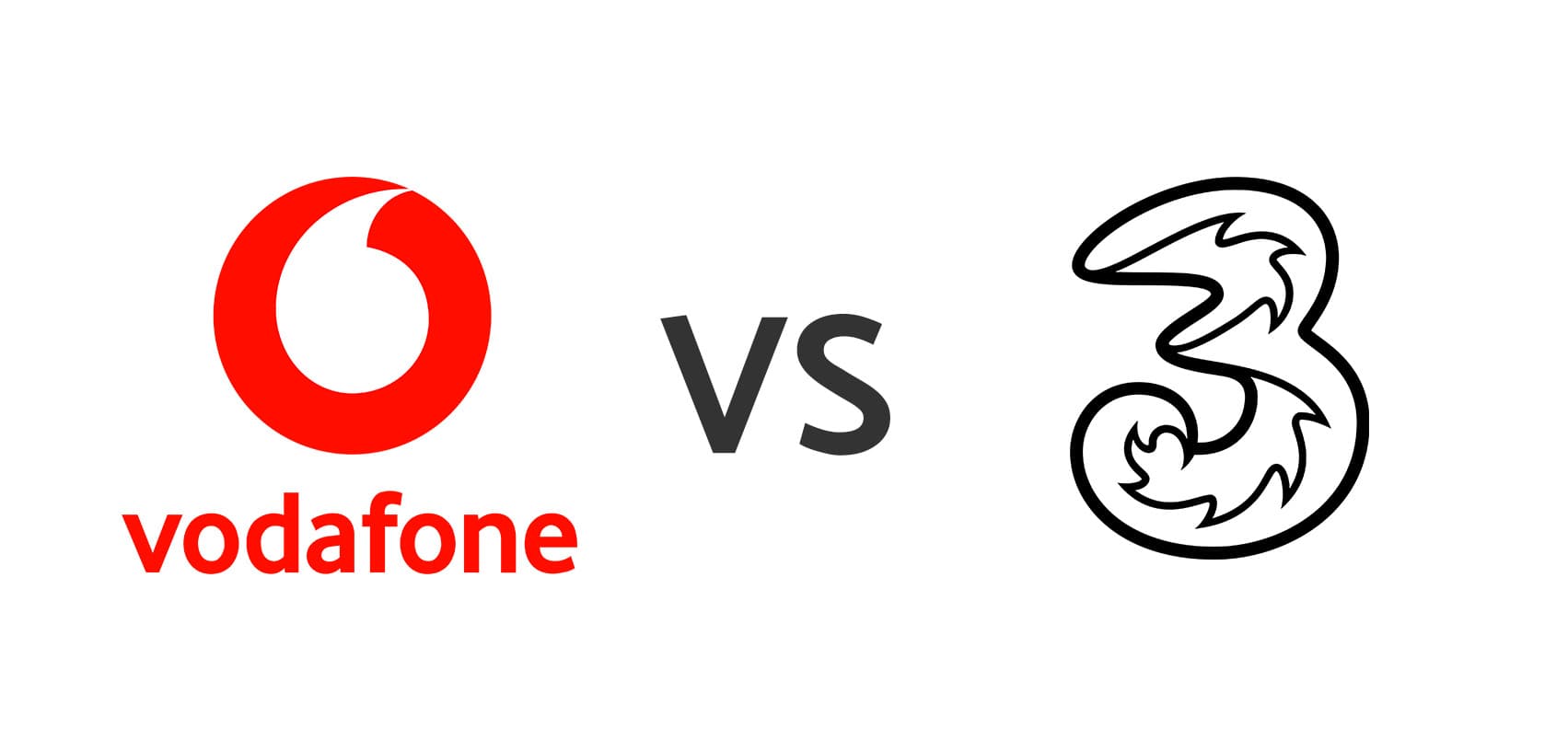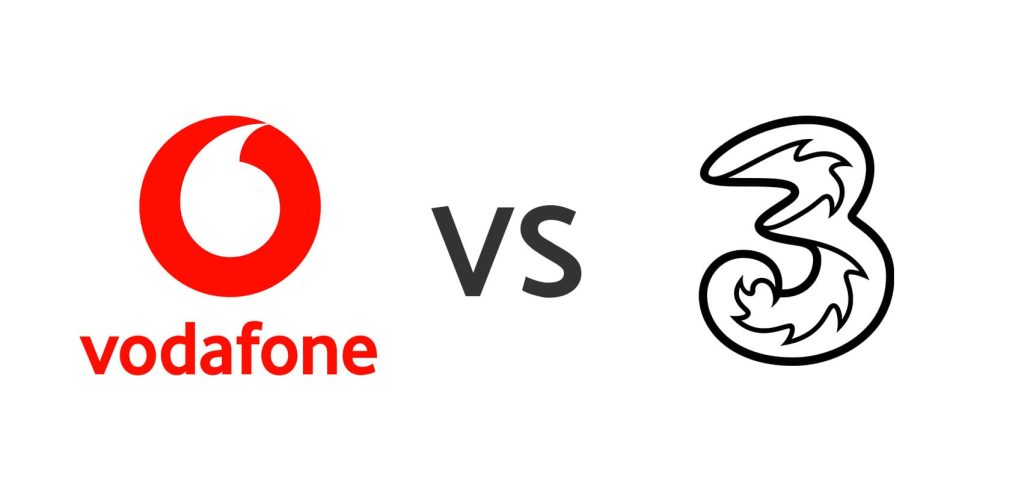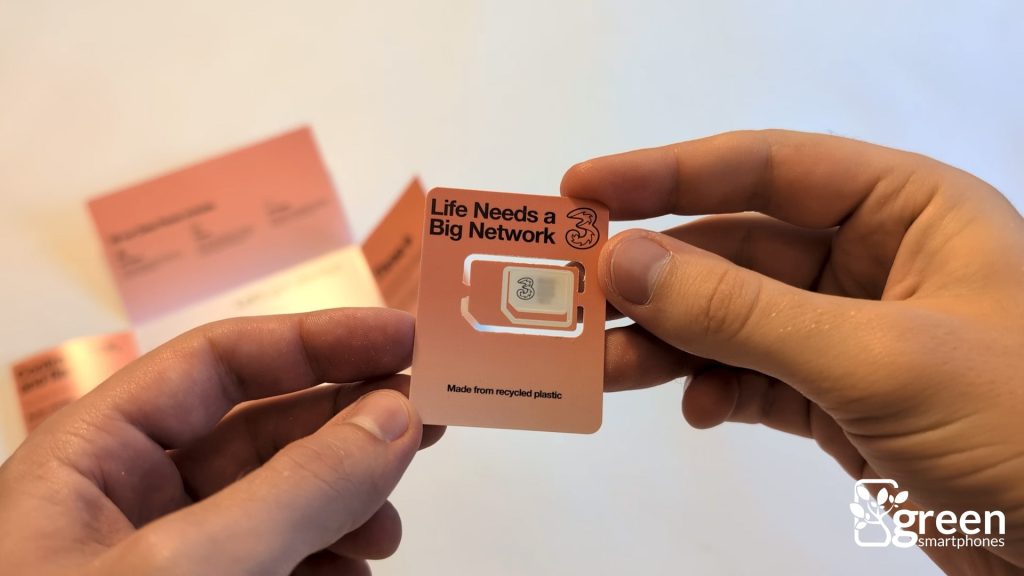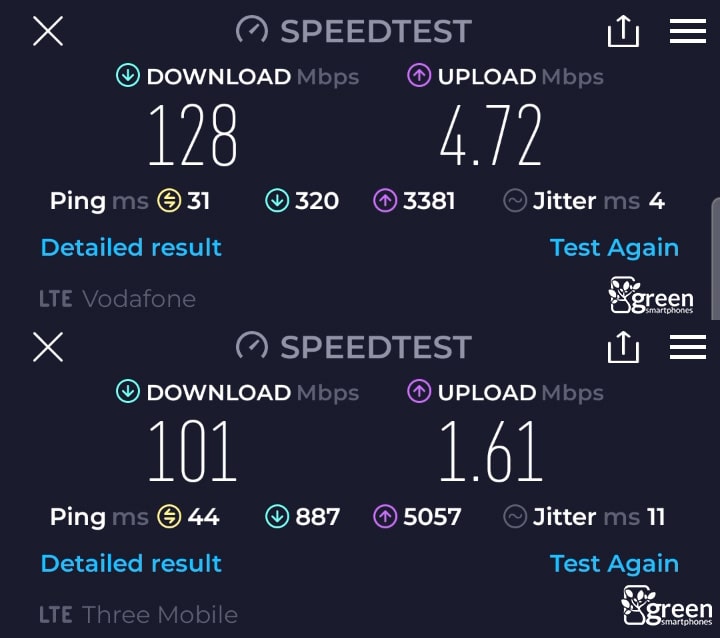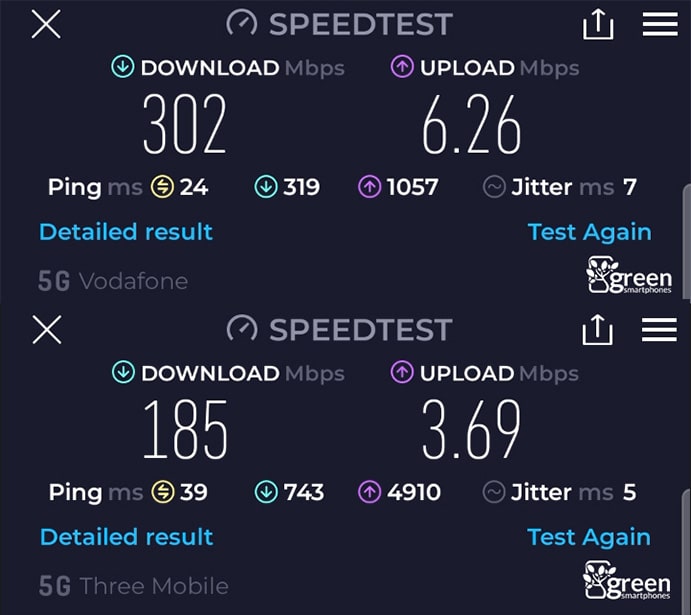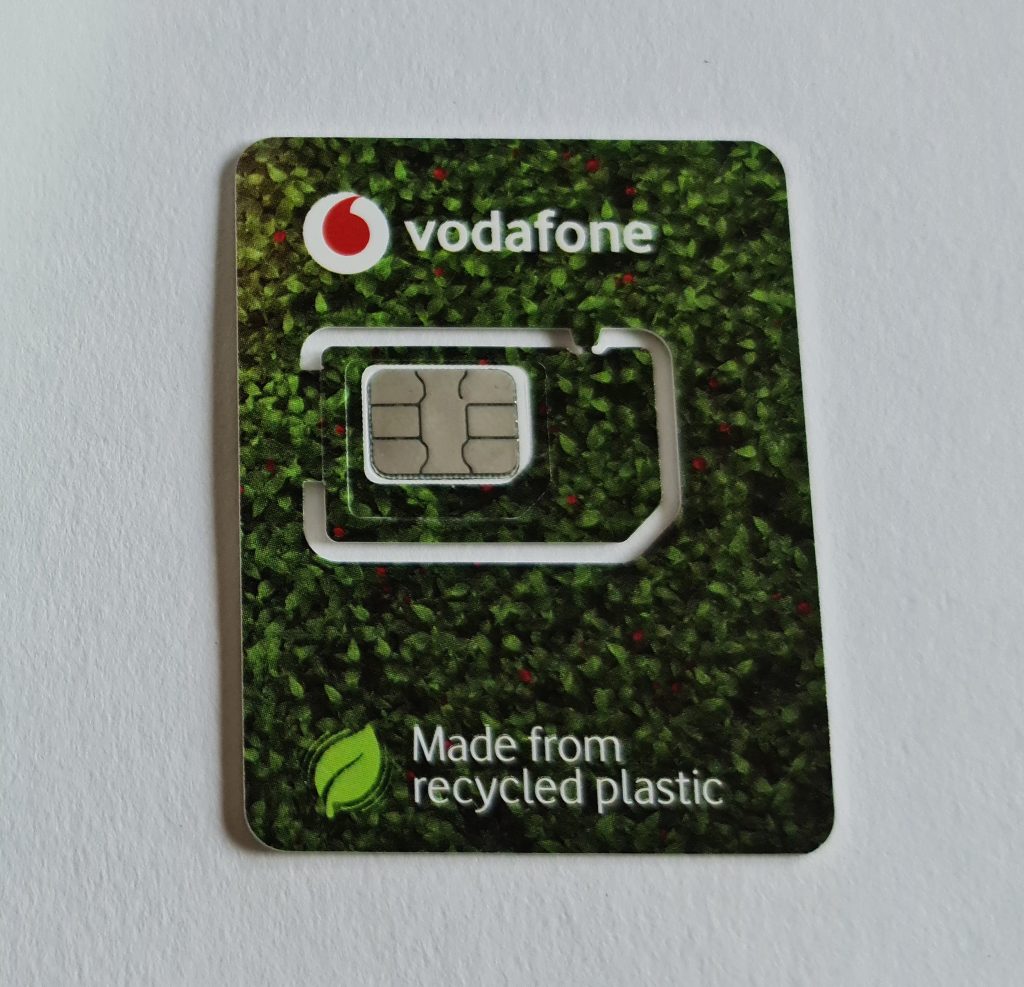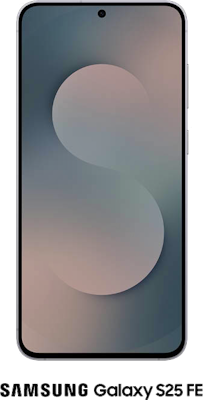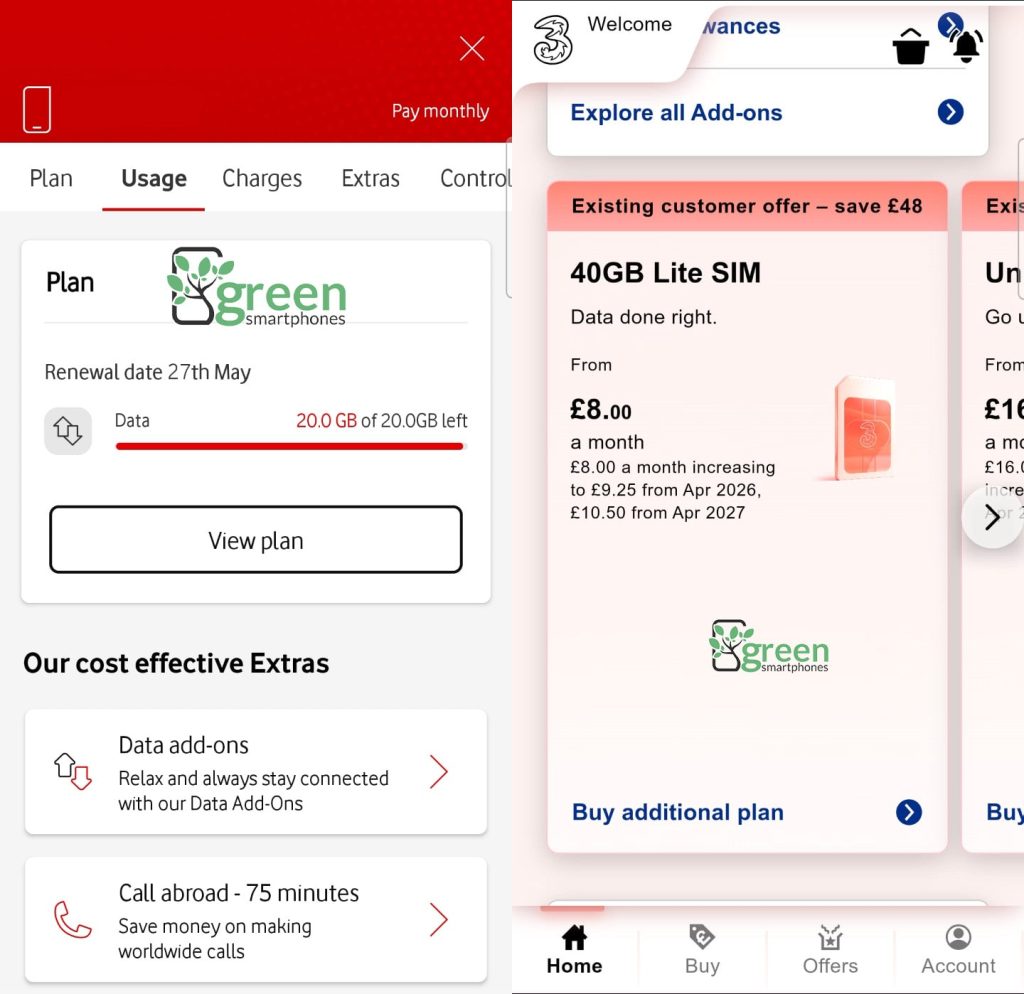Considering buying a phone or SIM plan from Vodafone or Three?
In this guide, we’ve explained the differences between these two mobile networks, based on their speeds and coverage, customer service, value for money, and more, to help you decide on the right one to join.
Before we begin, if you’re searching for a new mobile plan, on any network, use our comparison site to find the cheapest pay monthly phone plans or SIM-only deals on the market right now.
Contents
- Overview
- Coverage and speeds
- Roaming allowances
- Value for money
- Customer service
- Verdict: should you join Vodafone or Three?
Overview
Vodafone and Three are two of the big four mobile networks in the UK.
This means they each operate their own mobile infrastructure and masts, rather than leasing access through another parent network.
While they were historically competitors, Three and Vodafone have recently begun the process of merging into a single company, which makes their positions a bit unique in the market.
Eventually, the two networks will likely become a single brand you can buy from (most likely, Three will be absorbed into Vodafone) but for now, you can still buy mobile plans from both providers.
So far, the merger has allowed network sharing to begin between the two companies. Meaning, as a Vodafone customer, you’ll begin being able to use Three masts and vice versa, in areas where the other network has stronger signal – though this is still rolling out in different areas around the UK.
Even though they are now a part of the same company, there are still a number of differences between these two mobile networks.
Vodafone is more of a premium option. Their SIMs are more expensive, and come with more extras. They also allow you to get discounts when you bundle other Vodafone services with a phone plan, such as Vodafone Broadband.
Three is a cheaper, more basic option – they normally have the cheapest prices on the latest iPhone or Samsung phone on a contract, and offer very cheap SIM-only deals as well.
In return for the cheaper prices, Three SIMs have fewer inclusive benefits. For example, their free roaming allowances are normally much more restrictive, as we’ll discuss a bit later in the article.
However, both networks still include unlimited calls and texts to UK numbers on all their plans, and they both support WiFi calling and eSIMs as well.
Both providers also have their own rewards apps, giving you access to discounts and competitions in return for your loyalty as a customer.
Vodafone VeryMe Rewards offer discounted access to certain live events, as well as random prize draws for tickets to sports and concerts, and other prizes. Three+ Rewards are more food-focused, with smaller, more consistent rewards available at restaurants such as Papa Johns, as well as movie tickets and other entertainment venues.
Coverage and speeds
Vodafone and Three both have good 4G signal, but the other two big four networks – EE and O2 – have better coverage in the countryside.
We live in an area with really good Vodafone signal, and so we get stronger 4G speeds on this network, especially in terms of uploads.
Note that the following tests were performed before the two networks merged in our area, meaning we are measuring their performance independently.
In saying this, our coverage is still very good with both providers – we don’t encounter issues with call dropouts or getting online, though it can be difficult to pick up signal indoors sometimes on Three 4G.
On 5G, Three performs a lot better than Vodafone, though Vodafone has faster downloads in our area.
Three has the fastest average 5G speeds of any of the big four UK mobile networks. Vodafone is likely in second or third place, so they don’t perform too badly, as you can see from the speed test above.
The problem with Vodafone 5G is, they have 100 Mbps speed caps on many of their SIM plans, unless you pay more for an unrestricted “5G Ultra” tariff. The only reason we can get 300+ Mbps on Vodafone is because we have an older, unrestricted pay monthly tariff.
Therefore, if you want the fastest possible download speeds without breaking the bank, Three is generally a better choice than Vodafone. Their 5G upload speeds aren’t the best, but this is less important for mobile phone users, because your download speed is what affects how fast apps update, and how smooth your experience is when watching videos or browsing social media on the go.
Fortunately for Vodafone customers, you’ll soon be able to access Three network masts, giving you access to their faster average download speeds. However, you’ll still be limited to 100 Mbps if there’s a speed cap on your Vodafone plan.
Roaming allowances
Vodafone and Three’s roaming allowances are quite complex – the exact amount of inclusive roaming you’ll have depends on your SIM plan.
With most Vodafone pay monthly mobile contracts, you can roam free of charge in Europe, up to a 25GB monthly fair usage limit.
By comparison, with Three, you can only use up to 12GB of your data each month in their Go Roam in Europe destinations. And on their cheapest pay monthly SIMs, you’ll have to pay £2 per day to unlock your allowance, again with the same 12GB limit.
Both Vodafone and Three include free roaming in other common non-European destinations like Australia and Turkey on their most expensive plans. But in general, Vodafone’s allowances are more generous in terms of the amount of international data you can access each month.
On a pay as you go plan though, roaming with Three is generally a better choice.
Inclusive roaming is available on some of their data plans, but with Vodafone, you’ll normally need to buy one of their “Extras” to use your data or make calls/send texts overseas if you have a pay as you go SIM.
Value for money
Three is generally much better value for money than Vodafone.
If you compare SIM plans from both providers with similar data limits, Three is normally a much cheaper option.
It’s a similar story when it comes to pay monthly phone plans.
Three typically offers lower average monthly costs across the life of their contracts, when you compare their deals to Vodafone’s offers on the same phone.
Remember, use our comparison site to see whether Three or Vodafone offers the cheapest prices on a pay monthly phone contract for a device you want to buy, or a SIM-only deal with the amount of data you need.
Customer service
Vodafone and Three both have good customer service for a major network, but we think Vodafone’s support is slightly better at the moment.
Vodafone’s customer service team is UK-based, which isn’t the case with Three, and they’re a bit more helpful over the phone, in our opinion.
Three customer service still performs well, but they’re not quite as knowledgeable as Vodafone’s, from what we’ve seen.
However, Vodafone does have some issues when it comes to customer support.
The main problem is their website and mobile app can be difficult to use, in our experience. We try not to use the Vodafone mobile app as much as possible – it can be prone to visual glitches, and recently we’ve seen it is often down for maintenance during the day, which is a bit unusual.
We also find that the Three website makes it much easier to place orders and manage billing-related tasks.
So, it’s quite close between Vodafone and Three when it comes to customer service. In general, we actually prefer Three, since their self-service options are more useful, and their live chat makes it easy to get help when you need it.
But if you mostly prefer to get in touch over the phone, Vodafone is a better choice than Three in our opinion.
Verdict: should you join Vodafone or Three?
Whether Vodafone or Three is the right choice for you depends a bit on what you’re looking for.
Three offers cheaper, better value phone and SIM deals, most of the time. But Vodafone includes more benefits when you buy a SIM from them, especially if you want a pay monthly contract with good roaming allowances.
Vodafone has better phone support, but a much worse website and mobile app, and we think Three’s rewards programme is the better of the two providers.
The one area where Three easily outperforms Vodafone is 5G speeds and signal, though Vodafone still offers fast 5G if you get an unrestricted SIM.
We personally prefer Three for their cheaper prices, faster 5G performance, and more intuitive website and app.
But if you’re still not sure which network to pick, leave us a comment below, and we’ll get back to you as soon as we can.
About the author

Tom is the founder of Green Smartphones. You’ll find him writing about phones on the Green Smartphones blog, or talking about SIM deals and mobile networks on our YouTube channel. He’s the Android expert on the team – currently using a Google Pixel 9, recently upgrading from a very long-suffering Note 20 Ultra. When he’s not working on Green Smartphones, you’ll find him playing football or hiking.
